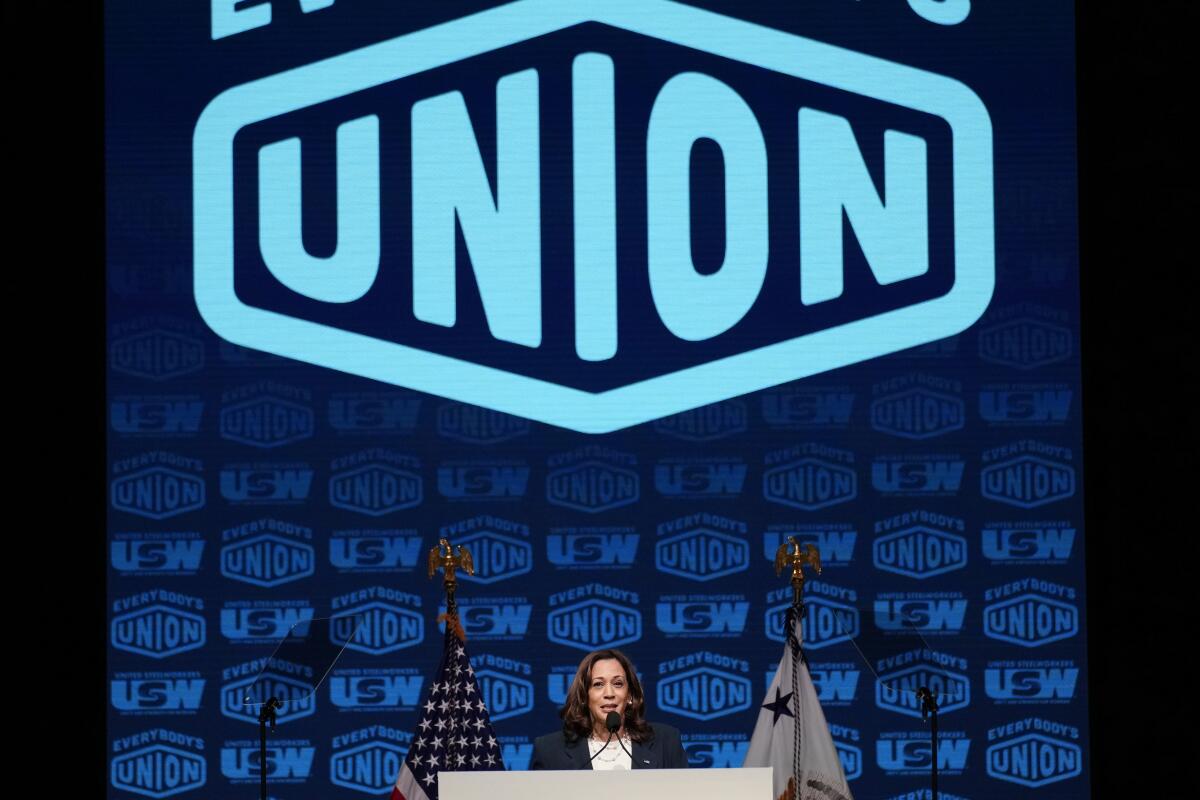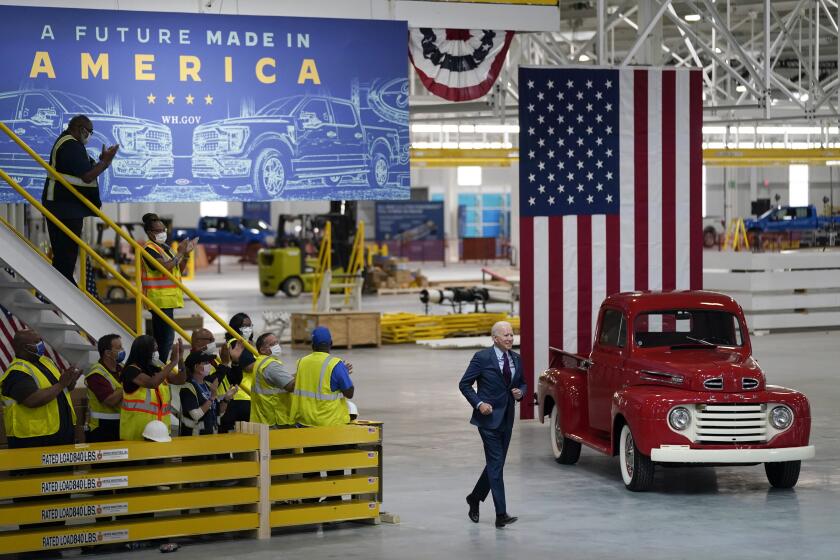Labor unions are hot, but their moment may not last

- Share via
WASHINGTON — American labor leaders see this as a moment for radical change: Workers at Starbucks coffee shops and Amazon warehouses are rising up and demanding representation. Polls show millions more support unions or wish they had the chance to join them. President Biden, with majorities in both chambers of Congress, wants to lead the most pro-union administration since Franklin D. Roosevelt.
“There’s a great reckoning and workers have had it,” said Mary Kay Henry, president of the Service Employees International Union, one of the largest and most influential unions.
Yet even as experts acknowledge the newfound excitement around labor, they caution that unions, which have suffered decades of declining membership, are unlikely to turn the tide. Unions’ moment of opportunity could already be slipping away. Republicans are poised to gain seats in the November elections. And a potential recession could wipe away the rare leverage workers have held in the tight labor market that emerged in the wake of the pandemic.
“The winds have been at workers’ back and that has helped spark labor drives in places that would have been unthinkable just a few years ago,” said Jake Rosenfeld, the author of “What Unions No Longer Do” and a sociology professor at Washington University in St. Louis.
But “there are clouds on the horizon,” he added.
Unions have long complained about the structural advantages held by employers fighting off organizing efforts. Employers can hold mandatory meetings where supervisors lobby against unions. And although firing workers for trying to organize is technically illegal, the penalties employers face for doing so are often small — and invariably come months or years after an organizer’s dismissal.
Employers can also drag out the union recognition process and the contract negotiation that comes after it, as they wait for employees to leave their jobs or for economic conditions to change. Employers’ power will only grow if the labor market, now one of the tightest in recent years, loosens, and workers begin fearing a recession.
Biden has put unions at the center of policy — as vehicles to rebuild middle-class jobs and address climate change and racial and gender inequity.
“When they’re holding those captive audience meetings, they can say basically, ‘Well, the economy is about to get bad, so it’s going to be harder for you to find a job,’” said Jon Shelton, a labor historian at the University of Wisconsin-Green Bay.
About 1 in 10 American workers is in a labor union, down from a peak of more than 1 in 3 in the mid-1950s. Government workers are five times more likely than private-sector employees to be in a union.
The National Labor Relations Board has received more requests to hold union elections this year than during the same period in 2021. But much of the increase in these requests for elections is coming from Starbucks cafes, each of which employs only a couple of dozen workers, meaning the potential effect on overall union representation may be modest, even if those elections succeed.
Shelton criticized Democrats for their failure to rally enough support to pass labor’s top priority, the Protecting the Right to Organize Act, which would overhaul the rules governing organizing. In an interview with The Times three months before his death last August, Richard Trumka, the influential president of the AFL-CIO, praised Biden for thinking like a union guy but said the success of his labor agenda would depend on passing that bill.
“If the PRO Act is not ultimately passed, then there won’t be a recovery for working people,” he said. “There’s nothing to drive it.”
Trumka predicted Democrats would muster 50 votes and find a way to pass the bill in the evenly divided Senate, with Vice President Kamala Harris’ tie-breaking vote. But it has been stalled, in part because Democrats have been unable to assemble the 50 votes or change the Senate filibuster rules, which require most legislation to get 60 votes.
The administration has tried to use its authority to make administrative changes that have helped organizers gain recognition at the National Labor Relations Board and to build in requirements on its signature spending bills that tie subsidies on things such as electric cars to American jobs.
“The PRO Act is still a necessary step, but what’s remarkable about the Biden administration is they are using every tool and level of government,” said Henry, of SEIU.
Biden and Harris, who leads the administration’s labor council, have also used their platform to support unions far more than even prior Democratic administrations, recording messages of support for Amazon workers trying to unionize and invoking workers and wages in their speeches. In May, Harris and Labor Secretary Marty Walsh met with Christian Smalls of the Amazon Labor Union and Laura Garza of Starbucks Workers United at the White House.
Harris on Wednesday was in Las Vegas — a city that will be key for control of the Senate — to speak at the United Steelworkers convention.
“You helped make America the most powerful nation in the world,” she said, recalling her youth in the Bay Area, learning about steelworkers’ role in building the Golden Gate Bridge and other American monuments.
Harris talked about the decline of manufacturing in the 20th century and the effect it had on middle-class wages and communities. She praised steelworkers for leading “a new era in the American labor movement,” including help in unionizing Google contractors, and went on to talk about union workers’ role in building high-speed internet, clean drinking water pipes and road projects approved during Biden’s tenure.
She promised the administration’s climate and healthcare spending bill, which is expected to win final passage in the House in the coming days, would bring jobs “in steel towns and in coal country”: forging steel for wind turbines, cutting glass for electric cars, installing rubber for solar panels.
Biden’s pro-union rhetoric goes further than that of leaders such as Barack Obama and Bill Clinton. An emphasis on workers may have helped Biden defeat former President Trump in 2020. But many white working-class union members have left the Democratic Party and could help Republicans regain control of the House, Senate or both in the November elections.
Mark Wilbur, president of the Los Angeles-based Employers Group, which advocates for business owners, said the decline in unions is a result of their obsolescence, especially in California, which has more worker protections than other states. Workers, he said, don’t want to pay dues for something they don’t need and consumers do not want to pay added costs.
“One hundred years ago, it was really needed,” he said. “Workers died on the job. Those days aren’t really relevant anymore.”
Liz Shuler, who replaced Trumka as president of the AFL-CIO, said that she’s in touch with members of the administration daily and that unions are not giving up on passing legislation. But she believes many Americans are overlooking the hundreds of billions in spending the Biden administration has secured for infrastructure — the semiconductor industry, electric car expansion, roads and highways.
“All of these huge investments have labor standards attached to them,” Shuler said, “to make sure that we’re going to benefit working people.”
She said her federation of unions is increasing its investment and cooperative efforts to help fledgling movements to unionize Amazon workers and other industries. Shuler pointed to the example of Microsoft, which agreed to make it easier for employees of one of its gaming subsidiaries to unionize, as a positive sign. But she said the struggle with Starbucks — which has raised wages and pushed back against organizers — shows resistance remains strong.
“The one missing ingredient is companies,” she said. “Companies are fighting workers with everything they have.”
More to Read
Get the L.A. Times Politics newsletter
Deeply reported insights into legislation, politics and policy from Sacramento, Washington and beyond. In your inbox three times per week.
You may occasionally receive promotional content from the Los Angeles Times.













